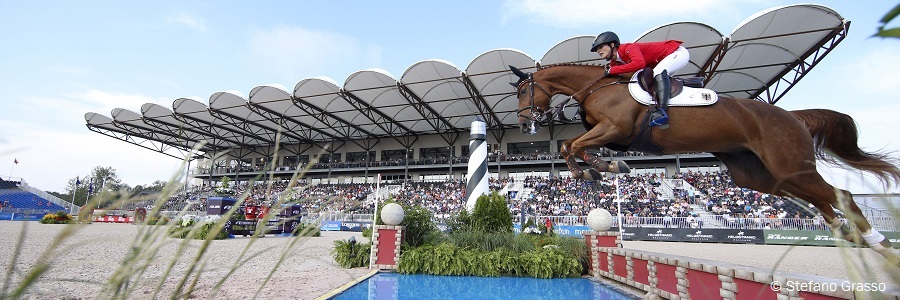The World Equestrian Games™ (WEG) – held every four years, halfway between the Summer Olympic Games cycle – has been hosted in an impressive list of major international cities around the world, including Rome, The Hague and Stockholm, to name a few. In September 2018, the multi-discipline event was brought to Tryon, N.C., a small town with just 1,615 inhabitants. In addition to representing a stark difference from the household names of previous years, Tryon had just 18 months’ lead-time to prepare for the sport’s biggest Championships. This all raised one very obvious question: how would a small town in North Carolina attract a global audience for a competition second in prominence behind only the Olympics?
It’s important to look at the Managing Partner of the 2018 WEG venue, Mark Bellissimo, the man who convinced the sport’s world governing body, the Fédération Equestre Internationale (FEI), that this virtually unknown, “local” venue had what it takes to host such a large-scale event in less than half the time of all previous Games. Bellissimo’s vision is to increase the global attraction and potential of equestrian sport by making it more accessible to a wider audience. For a number of years, Bellissimo has been doing this through his four properties in the United States: Palm Beach International Equestrian Center (Florida), Tryon International Equestrian Center (North Carolina), the Colorado Horse Park (Colorado) and the Rolex Central Park Horse Show (New York).
But is it unreasonable to think equestrian sport can one day compete alongside mainstream sports like tennis and golf? Typically speaking, the most popular of sports, globally, are those which can be adjusted to the idiosyncrasies of an individual and, therefore, be taken up by anyone, from anywhere, at any age. Common perception is that equestrianism is expensive, elitist and beyond the reach of the everyday person. This effect makes the sport’s global appeal small.
However, on the contrary, Bellissimo highlights that, “27 million people ride a horse every year, which is more than the 23 million who play tennis or the 25 million who golf.” Given these figures, the accessibility to horses is greater than perhaps first thought, providing equestrian rights holders, event organizers and sponsors with a seemingly broad and, importantly, untapped audience. Bellissimo is determined to target these “one-time riders” and saw WEG as another platform on which to project the equestrian message.
The sports industry has enjoyed phenomenal growth in the last decade, with KPMG reporting that in 2017 the entire global sports market – including infrastructure, events, training and sports goods – was estimated to be worth between $600-$700 billion per year, and its growth outpaced the GDP growth of most countries. Has equestrian sport been part of this exponential growth? Looking at the list of global sponsors and the broadcast viewing numbers around the world from WEG, the answer is “yes.”
NBC was signed to cover WEG 2018 in the U.S., and the agreement was the largest ever signed by a WEG host venue: more than 65 hours of coverage, 57 of which were live. This is unprecedented in the equestrian world and brought the eight disciplines – show jumping, dressage, eventing, para-dressage, reining, endurance, driving and vaulting – into mainstream America. Not only was the amount of coverage impressive, but the post-event viewing figures reveal the huge interest in equestrian sport. The Games were seen by 4.7 million unique viewers across just the two NBC networks alone.
So, how does a deal like this affect the sport as a whole? In 2015 the sports market in North America alone was worth $63.9 billion, and it is expected to reach $75.7 billion by 2020 (Forbes, October 2016). The biggest reason for such growth is the projected increase in revenue derived from media rights’ deals, which are predicted to surpass ticket revenues as the sport industry’s most lucrative segment. With deals being made with the likes of NBC, equestrianism can surely tap into this billion-dollar growth.
Tickets for the 11 days of WEG competition were snapped up by more than 200,000 passionate and loyal fans. Admittedly, this was lower than projected targets; however, the event had to contend with many challenges, not least was Hurricane Florence, which caused devastation throughout the Carolinas and forced the venue to close for a whole day. The result of which cancelled one of the largest ticket attraction events.
There is a hugely dedicated and engaged equestrian audience who will travel across the globe, despite natural disaster warnings, to watch their favorite athletes and teams compete. Additionally, broadcast results confirm an appetite for equestrian sport beyond the traditional fan. Sponsors should acknowledge this sleeping giant of a sport and determine how they can join high-profile brands, such as Land Rover and Rolex, which are already capitalizing on the sport’s audience.
How was rEvolution involved with WEG?
Over the course of the 18-month project, rEvolution was part of the team who ran the international PR and marketing for the event with the key responsibility for running all media operations on-site (managing a team of 45 contractors).
The on-site media operations included:
– Running all media centers (one international and two satellites)
– Managing all mixed zones (broadcast, print and digital – working very closely with NBC and Sunset & Vine)
– Daily communications – covering all crisis management
– Handling the accreditation process for more than 1,000 international media in attendance
– Social media management for all aspects of the event
The project was a fantastic event on which to work, and rEvolution was proud to be a part of the talented and passionate team behind the Games.

